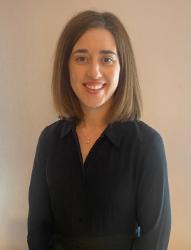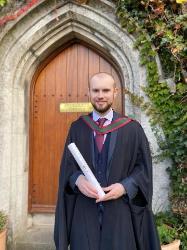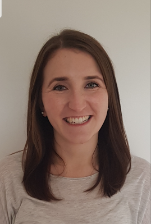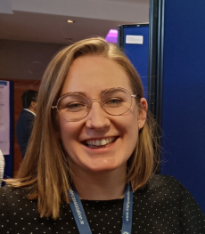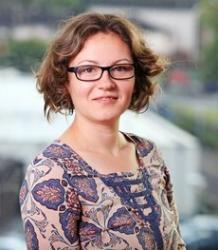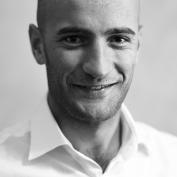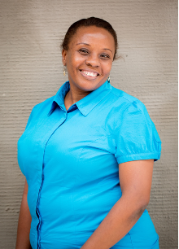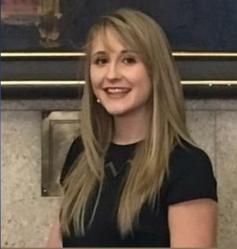Current Post Graduate Students
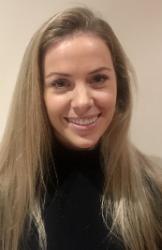
Dr Andrea Bowe
PhD Title: Identifying and Predicting Below Average Intellectual Function in Childhood
Andrea is a public health medicine SpR and ICAT fellow. Her PhD will focus on prediction of neurodevelopmental outcomes using epidemiological data and machine learning.

Ms Anne Desmond O'Hanlon
MSc Title: Evaluation of the effectiveness of a community-based adolescent counselling service in an Irish context
Anne has spent the last number of years working in the area of community mental health. There are many factors that affect mental health, and all of these have been exacerbated by the Covid -19 pandemic. Adolescence is a unique and formative time and is a crucial period for developing social and emotional habits that are vital to mental wellbeing.
The study is focused on adolescent mental health aged between 12 and 18 years. Examining the issues presenting for adolescents, the aggravating factors as a result of Covid -19, identify and the circumstances that have brought them to the point of needing a therapeutic intervention.The aim of the study is to evaluate an existing Adolescent Counselling Service and to explore the use of technology through connected health, to promote in the delivery of this service in the future.
Ms Sarah Fenton
PhD Title: Health Technology Assessment of the New Model of Preterm Parenteral Nutrition in Ireland
Sarah is a Clinical Pharmacist in Cork University Hospital and Cork University Maternity Hospital, with a special interest in neonatal nutrition and healthcare informatics.
Optimal nutrition, in the first weeks of life, is of critical importance in preterm infants due to its direct impact on growth and neurodevelopment. Translational research over a decade by CUMH and UCC has developed an innovative data-driven parenteral nutrition model of care for preterm infants, now in use in all neonatal units in Ireland. Incremental innovation to include additional clinical decision support and a move from paper to a digital format is currently underway.
Sarah’s Employment Based PhD with the INFANT Centre will undertake a Health Technology Assessment, including the cost-effectiveness, acceptability, and affordability of this new model of care as it evolves.
Dr Aoife Gallagher
MD Title: ARChhIE: A Retrospective Comparison of Irish and Spanish IgE- Mediated Egg Allergy Strategies
Egg allergy is the second most common food allergy in children and one of the main causes of anaphylaxis in infants. In many European countries standard practice for children with IgE-mediated egg allergy is total avoidance until 6-7 years of age. In Ireland reintroduction of egg to the diet is reached by most infants following home-based induction of egg protein via the egg ladder. The use of the egg ladder is relatively new, however appears to be a successful approach. The aim of this project is to critically examine its effectiveness and compare it to the more traditional management used across Europe. Should the egg ladder prove to be a preferable strategy we hope to promote it as an international standard management for IgE-mediated egg allergy in infants.
Mr Richard Harris
PhD Title: Connected Health Avenues for Adolescent Mental Health
The aim of this project is to review Child and Adolescent Mental Health Services (CAMHS) with the aim of developing a connected health application to support the provision of these services.
Initial stages of the project will involve communication with the relevant stakeholders, including clinicians, policy makers and services users, to understand the needs of these groups. This will allow us to clearly identify the key requirements for this connect health application. This communication will take the form of focus groups, surveys and interviews, as well as any other relevant research methods that provide the appropriate level of academic rigor.
Following the identification of the key requirements, a design science research methodology will be employed to develop and test the application, with the end goal of creating an application that will best serve the needs of CHAMS. Publications are expected at various stages throughout the project.
Dr David Healy
PhD Title: PIMENTO – Preterm Infants: Microbiome Establishment, Neuro-crossTalk and Origins.
Dave is a medical graduate of University College Cork and is currently training as a Paediatric Specialist Registrar with a view to specialising in Neonatology.
The human microbiome is a rapidly expanding area of research which looks at the relationship between our health and the community of microbes that passively reside in and on us. Alteration in how this community is formed and structured may have long term impacts on an individual’s health.
Dave’s PhD looks to delve into the impact of prematurity and its associated management on the establishment of the intestinal microbiome and how this might relate to health outcomes. Working in conjunction with APC Microbiome Ireland and Teagasc, he hopes to clarify causes and impacts of dysbiosis in this vulnerable preterm population. Furthermore, novel analysis of gut-brain signalling in very preterm infants will attempt to determine whether intestinal dysbiosis may play a role in neurodevelopment of preterm babies.
Dr Elaine Kennedy
MD Title: Biomarkers of Evolving Paediatric Type 1 Diabetes
Elaine is a clinical research fellow in INFANT. Her area of interest is the development of Type 1 Diabetes (T1D) in children. Her MD is entitled 'Biomarkers of Evolving Paediatric T1D'. This research aims to identify novel gut microbes that are playing a role in T1D progression and control. The goal of this work is to identify new treatments that will slow down disease progression and improve diabetes control.
Dr Dhanis Lad
MD Title: Short-term Topical Application to Prevent Atopic Dermatitis
Eczema is the most common skin disease of childhood, affecting 20% of children in Ireland. Children with eczema have relatively “leaky skin”, as eczema affects the barrier function of the outer layer of skin called the epidermis. This “leakiness” allows high levels of water loss out through the skin and can allow infection and allergens to move in through the skin, possibly causing allergies to substances that cannot enter the body as easily through normal skin. The “leakiness” reflects low levels of some natural moisturising factors (NMFs) in the skin, which can be linked to the filaggrin (FLG) gene, the gene most strongly linked to eczema. Skin barrier structure (NMF content) can be measured painlessly using a machine called a Raman spectroscope. Skin barrier function can be also be measured painlessly using a machine that measures transepidermal water loss (TEWL) – that is the water that is lost through the outer layer of skin.
The STOP AD intervention trial will investigate the effect of early skin barrier protection on the prevention of eczema and food allergy in high risk children. In STOP AD, infants at high risk of having eczema will be identified using family history and neonatal NMF and TEWL values. These infants will be randomised to either skin barrier protection with a commercially available moisturiser for the first 2 months or to routine care. The study’s primary outcome will be the incidence of eczema at 6 and 12 months and the incidence of food allergy at 1 year. Filaggrin gene status will also be determined.

Ms Sonia Lenehan
PhD Title: The effect of environmental enrichment on neurodevelopment in term babies
Sonia Lenehan graduated from UCC in 2016 with a B. Sc (Hons) in Neuroscience. Sonia is currently a PhD research student with the INFANT centre since 2017. The title of her PhD is “The effect of environmental enrichment on neurodevelopment in term babies.” Her PhD will look at environmental enrichment, in the form of lifestyle and sensory experience, and its effect on the brain. Sonia will use eye-tracking as a way to asses social cognition in different groups of infants.
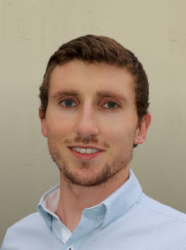
Mr Chris Lundy
PhD Title: Biomedical Signal Processing for Early Detection of Brain Injury in Preterm Infants
Chris' PhD involves using novel signal processing and machine learning methods to extract and combine pertinent information from near-infrared spectroscopy (NIRS) and electroencephalography (EEG) data collected by INFANT from preterm infants in the neonatal intensive care unit (NICU).
In developing automated biomedical signal analysis methods, the ultimate aim of this project is to aid in the early detection of brain injury in preterm infants.

Mr Fabio Magarelli
PhD Title: Machine Learning for the Prediction of Seizures in Neonates
Fabio is a PhD student at the Centre for Research Training in Artificial Intelligence and the Department of Paediatrics & Child Health, University College Cork. His research is in the field of EEG data analysis and applied Machine Learning (ML)which is a subfield of Artificial Intelligence applied to Medicine that is concerned with tools and techniques to produce diagnostic instruments for clinicians in the field of Paediatrics such as EEG abnormalities and patterns detection.
Dr Anne Murray
PhD Title: he SOPHIE Study: School-aged Outcomes Post Hypoxic Ischaemic Encephalopathy
Anne is a medical graduate of UCC. She is a Specialist Registrar in Neonatology, a PhD student at UCC and a Clinical Research Fellow in INFANT. Anne’s PhD is focused on examining school-aged outcomes after Hypoxic Ischaemic Encephalopathy, which affects 2 infants per 1000 births. Through psychological assessment and MRI imaging, her study aims to examine early neonatal clinical findings and their correlation with school-aged outcomes, to gain a better understanding of the long-term prognosis in HIE since the introduction of therapeutic hypothermia.

Dr Jurate Panaviene
PhD Title: Non-Invasive lung Oxygen Monitoring of Infants (The NIOMI Study)
Jurate Panaviene is a MD student at UCC and a Clinical Research Fellow at INFANT Centre. Her research project is about Non-invasive Lung Oxygen Monitoring In Term Infants (The NIOMI Study). It is a part of collaborative initiative between research teams at INFANT and Biophotonics@Tyndall. The current project is aiming to investigate a new optical system and it’s potential to provide continuous information on lung function of neonatal intensive care unit patients.
Dr Andreea Pavel
PhD Title: Study of electroencephalogram, heart rate variability and clinical parameters as early biomarkers of encephalopathy in newborn infants
Hypoxic-ischaemic encephalopathy (HIE) is the most common cause of neonatal encephalopathy, associated with a high risk of death and lifelong disability. Therapeutic hypothermia is currently the only treatment recommended for moderate and severe HIE cases. There is a 6-hour widow to assess an infant at risk of HIE and decide if therapeutic hypothermia might be beneficial. Several studies show that the sooner you start the treatment, the more effective it is. Unfortunately, there is no treatment recommended for mild HIE, although we now know that 20-40% of infants with mild HIE have a poor neurodevelopmental outcome. The initial neurological assessment is sometimes unreliable to differentiate between HIE grades and sometimes is very difficult to accurately select the infants that might benefit from cooling and that might have a poor outcome, especially in the mild spectrum. We need new strategies to obtain a quick and accurate diagnosis of HIE severity by adding new early biomarkers for HIE grade and outcome prediction.
The main aim of Andreea's PhD is to assess the early physiological biomarkers in HIE: to add to the clinical features, that we are currently using in practice, the most predictive electroencephalographic (EEG) and heart rate variability (HRV) features. She will also characterise the standard EEG and HRV features seen in all HIE grades, and identify those features that are most predictive of poor neurodevelopmental outcome.
Dr Jacopo Proietti
PhD Title: Clinical And Neurophysiological Detection In asphyxiated neonates, aimed at Determining an Accurate selection for hypothermic Treatment in the Early neonatal period (The CANDIDATE Study)"
Jacopo is a MD specialist in Child Neuropsychiatry, trained in pediatric neurological disorders with particular interest in neonatal neurology and electrophysiological evaluation of epilepsy. His PhD research project is focusing on multimodal assessment of infants with Neonatal Hypoxic Ischaemic Encephalopathy during the earliest hours after birth, performed through video-EEG-polygraphy and simultaneous somatosensory evoked potentials combined with detailed neurological examination. This approach will potentially provide novel insights for the clinician and improve the ability to identify those infants who will benefit from early treatment. This is a collaborative project between the INFANT Research Centre and University of Verona (Italy).
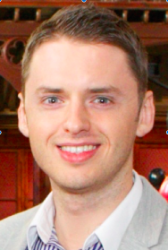
Dr Cathal O'Connor
PhD Title: SPINDLE - Assessing SleeP IN infants with atopic Dermatitis by Longitudinal Evaluation
Cathal is a medical graduate of University College Cork (2013) and completed basic specialist training in both paediatric (2016) and adult (2018) medicine with the Royal College of Physicians of Ireland (RCPI). He is a Dermatology Specialist Registrar with RCPI and Fellow of the Irish Clinical and Academic Training (ICAT) programme.
Cathal's PhD will assess the sleep disruption seen in atopic dermatitis ('eczema') which affects 20% of Irish children. SPINDLE will recruit a cohort of infants with eczema and compare their sleep macrostructure and microstructure to a matched control group. This will be achieved by novel and thorough analysis of sleep quality and quantity and skin barrier and cytokine assessment.
Dr Aisa Shayo
MD Title: Assessing the impact of Kangaroo Mother Care in neonatal care units of hospitals in Kilimanjaro, Northern Tanzania
In Tanzania Prematurity is still the leading cause of neonatal death. Caring well the premature baby will reduce neonatal death as well as under 5 years mortality hence will archive national target. The anticipated achievement might improve using a focused, setting appropriate intervention care bundle which is acceptable and sustainable to health care providers and mothers.
Aisa she is thinking of the improved implementation may impact on a reduction of neonatal mortality and major morbidity and can be continued in conjunction with respiratory support using bCPAP. These will be associated with a reduction on neonatal mortality and major morbidity and can be continued in conjunction with respiratory support using bubble CPAP. The implementation of KMC in neonatal wards in Northern Tanzania can be improved using a focused, setting appropriate intervention care bundle which is acceptable to health care providers and mothers.
Aisa is trying to see what is the current uptake of KMC at the neonatal units of 4 hospital in Kilimanjaro region and if there is an impact on KMC after introduction bundle of care in those four hospital.
Dr Iyshwarya Stapleton
PhD Title: A Longitudinal Observational Assessment of Diastolic Function during the Transitional Period and Infancy using Serial Echocardiography (The DiFuSE Study)
Iyshwarya is a medical graduate of UCC. She is currently a Specialist Registrar in Neonatology with the Royal College of Physicians of Ireland (RCPI), a PhD student at UCC and a Clinical Research Fellow with INFANT. Her areas of interest are neonatal haemodynamics and diastolic cardiac function. DiFuSE will assess diastolic function during the neonatal transitional period and long-term into infancy. This will be a prospective, single-centre, observational study on neonates born at 35 weeks’ gestation or above. The goal is to create reference values for diastolic function parameters and to assess the influence of pre-defined antenatal, intrapartum, maternal, and neonatal factors on cardiac function.
Dr Carol Stephens
PhD Title: SYNAPSE- EpilepSY After NeoNAtal ElectrograPhic Seizures
Carol is a paediatric SpR with the Royal College of Physicians of Ireland (RCPI) and currently a Clinical Research Fellow with INFANT. Her area of interest is post neonatal epilepsy. SYNAPSE aims to determine the incidence of post-neonatal epilepsy in term infants who went electrographic monitoring in the neonatal period due to high risk of seizures. It will further evaluate if neonatal seizure(NS) aetiology and seizure burden are related to post neonatal epilepsy and if NS characteristics are related to post neonatal seizure type. SYNPASE will also evaluate what risk factors give rise to future epilepsy in those infants with no electrographic seizures.
This will be a retrospective, single centre, observational study and infants will be recruited from previous studies since 2003 with INFANT. In our centre, the neonatal unit, paediatric department and neurophysiology departments are tri-located offering us the unique opportunity to determine the true incidence of post neonatal epilepsy in Irish children.
Ms Soraia Ventura
PhD Title: Electroencephalographic Study of the Effect of Massage on Infant Sleep
Soraia's background is in Neurophysiology and her main interests are within the area of Electroencephalography. After gaining relevant experience in the clinical field, Soraia is currently working on the Electroencephalographic Study of the Effect of Massage on Infant Sleep and is supervised by Prof Geraldine Boylan and Dr Sean Mathieson.
Parent-led baby massage is known to provide environmental enrichment through tactile stimulation and bonding between babies and their parents. We aim to test if routine parent-led massage during the first four months of life may be associated with brain development. Our study participants were split into two groups soon after birth: routine massage (intervention) and non-massage (controls). Using EEG at four months of age, I am studying sleep spindles which are brain maturational markers measured during specific stages of sleep. We will compare these between intervention and control groups.
This study will also be the largest to describe sleep spindles in detail during this critical stage of development.

